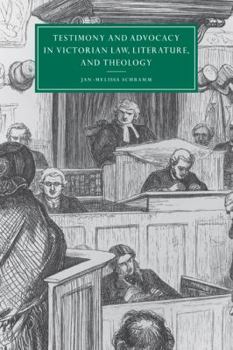Testimony and Advocacy in Victorian Law, Literature, and Theology
Select Format
Select Condition 
Book Overview
The eighteenth-century model of the criminal trial - with its insistence that the defendant and the facts of a case could 'speak for themselves' - was abandoned in 1836, when legislation enabled barristers to address the jury on behalf of prisoners charged with felony. Increasingly, professional acts of interpretation were seen as necessary to achieve a just verdict, thereby silencing the prisoner and affecting the testimony given by eye witnesses at criminal trials. Jan-Melissa Schramm examines the profound impact of the changing nature of evidence in law and theology on literary narrative in the nineteenth century. Already a locus of theological conflict, the idea of testimony became a fiercely contested motif of Victorian debate about the ethics of literary and legal representation. She argues that authors of fiction created a style of literary advocacy which both imitated, and reacted against, the example of their storytelling counterparts at the Bar.
Format:Paperback
Language:English
ISBN:0521026350
ISBN13:9780521026352
Release Date:April 2006
Publisher:Cambridge University Press
Length:264 Pages
Weight:0.86 lbs.
Dimensions:0.6" x 6.0" x 9.0"
Customer Reviews
0 rating





